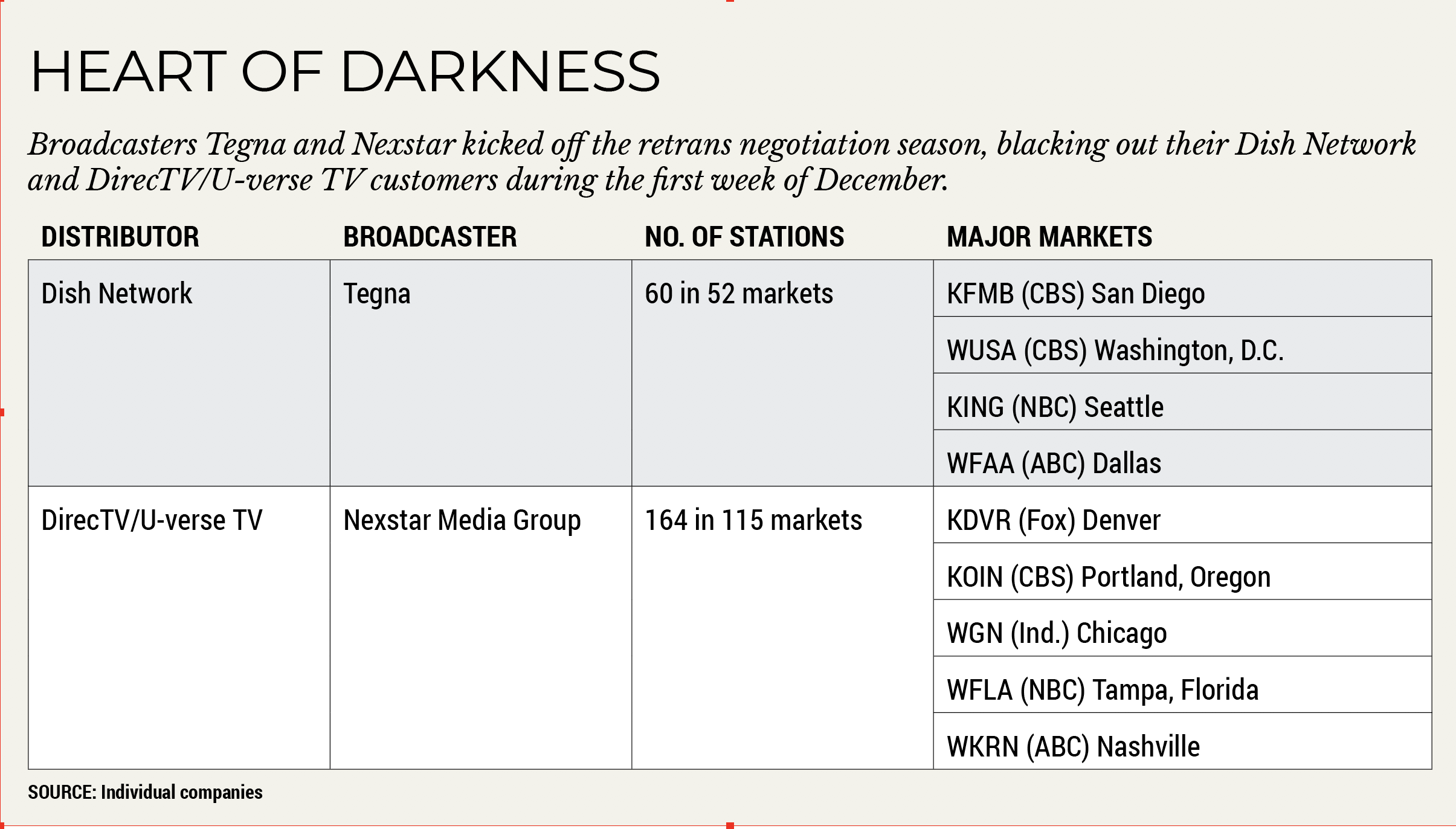Retrans Season Starts With a Bang
Tegna, Nexstar lead off with blackouts; other deadlines are ahead

The smarter way to stay on top of the multichannel video marketplace. Sign up below.
You are now subscribed
Your newsletter sign-up was successful
The retransmission-consent season is officially upon us, with two major blackouts already begun and more likely on the way.
At press time, the two major satellite-TV providers — DirecTV and Dish Network — lost access to stations owned by Tegna and Nexstar Media Group, respectively. They are a mix of the Big Four broadcasters (ABC, CBS, NBC, Fox), independents and affiliates of The CW and MyNetworkTV.
Tegna pulled the signals of its 60 TV stations in 52 markets from DirecTV and U-verse TV customers at 7 p.m. ET on Dec. 1, ending days of speculation. The station group had given DirecTV a one-day extension of its original deal, set to expire on Nov. 30, usually a sign that talks are progressing. But that was not the case as the Tegna stations went dark after the new deadline passed without a deal.
On its station websites, Tegna claims its rate increases are market-based and reflect the quality programming it provides, pointing to the “hundreds of deals” it has reached with other distributors.
“Those providers all felt that they were able to reach a fair deal with us while continuing to offer value to their subscribers,” Tegna said. “There is no reason why this negotiation with DirecTV and AT&T U-Verse should be different.”
Carriage Offer Rejected
DirecTV and U-verse TV parent AT&T, citing the importance of unfettered access to local news during a pandemic, urged Tegna to keep the stations live to its customers as talks continued, but that offer was not taken.
The smarter way to stay on top of the multichannel video marketplace. Sign up below.
“In the midst of an ongoing pandemic, Tegna is demanding the largest rate increase we have ever seen, and intentionally blacking out its most loyal viewers,” AT&T said in a statement. “We challenge Tegna to return its local stations immediately while we finalize a new agreement and pledge to pay Tegna retroactively whatever higher rates to which we eventually agree. We share our customers’ frustration, appreciate their patience and intend to do all we can to resolve this matter soon.”
Dish Network first warned of the possible Dec. 2 loss of 164 Nexstar stations on Thanksgiving Day (Nov. 26). That warning became reality at 7 p.m. on Dec. 2.
As usual, the dispute is centered on money. Dish claims Nexstar is demanding record setting rate hikes — the “shocking increase is the highest we’ve ever seen,” Dish TV group president Brian Neylon said in a press release. Nexstar fired back, saying it has made several reasonable offers, all rejected by Dish, since the talks started in July.
While the length of the blackouts could go either way — DirecTV said in a statement that past Tegna disruptions of service lasted mere hours or days — other potential disputes with other distributors are beginning to queue up.
Comcast faces retrans negotiations with about 79 stations across its footprint. Many of those — about 31 — are owned by its NBC and Telemundo units, so talks are expected to be at least cordial. But there are another 43 stations owned by Hearst TV, Cox Media Group and Hubbard Broadcasting that are also due for renewal. About 38 out-of-market stations owned by Hearst could be dropped on Dec. 22.

“On December 22, 2020, we may be removing some TV stations from neighboring markets,” Comcast said on its Xfinity customer support site. “Our agreements with broadcasters expire from time to time. We’re currently negotiating with the stations’ owner to be able to continue carrying the signals of its stations.”
That comment changed over the past few days: Earlier in the week, Comcast said on its customer support website that it would be removing the channels. Now the subtle change could hint that the two may be closer to an overall deal that includes the out-of-market properties. Only time will tell.
Out-of-Market Issues
Even if those out-of-market stations go away, neither side should be too upset. Comcast wasn’t paying for them before and won’t be if it drops them. And the viewers affected weren’t being counted in the Hearst stations’ ratings because they aren’t in the same DMA. Once the duplicate stations are removed, residents in those affected markets can still access that station’s local news, either via their respective websites or through the NewsON app, which offers free access to local news from more than 275 stations in 165 markets.
Hearst Television declined comment.
Comcast also faces retrans negotiations in January with three stations owned by Sunbeam Television: WHDH (independent) in Boston; WLVI (The CW) in Cambridge, Massachusetts; and WSVN (Fox) in Miami, Florida. Sunbeam has been a fairly aggressive retrans negotiator in the past — it blacked out DirecTV customers in 2012 and in 2016 for a few weeks — but hasn’t had any major scuffles recently.
Mike Farrell is senior content producer, finance for Multichannel News/B+C, covering finance, operations and M&A at cable operators and networks across the industry. He joined Multichannel News in September 1998 and has written about major deals and top players in the business ever since. He also writes the On The Money blog, offering deeper dives into a wide variety of topics including, retransmission consent, regional sports networks,and streaming video. In 2015 he won the Jesse H. Neal Award for Best Profile, an in-depth look at the Syfy Network’s Sharknado franchise and its impact on the industry.

